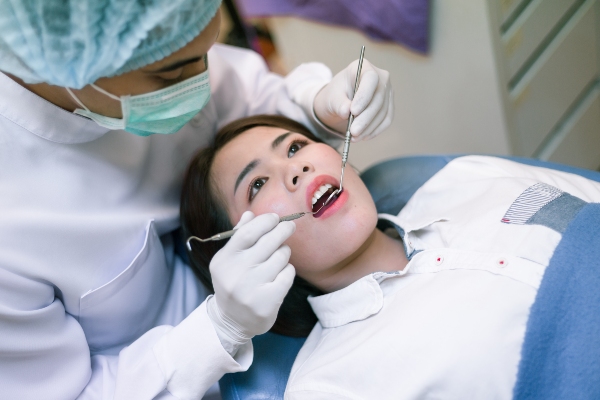Early Signs and Symptoms of TMJ Disorder

The temporomandibular joint, commonly called TMJ, is a small joint, which is located in front of your ear where your lower jaw and skull meet. It allows your lower jaw or mandible to move and function. TMJ disorders are common and have a wide range of symptoms. Read on to learn about the early signs and symptoms of TMJ disorders.
Common signs and symptoms of TMJ disorders
The possible causes of TMJ disorders include arthritis, injury, dislocation, stress and teeth grinding and tooth and jaw alignment. However, in many cases, the exact cause of a person’s TMJ disorder can be hard to determine. There are many symptoms that are associated with TMJ disorders. A person can benefit from knowing the signs and symptoms of TMJ. This will help a patient to seek treatment early. Here are some of the symptoms of TMJ disorders.
Pain
Pain, especially in the jaw joint and/or chewing muscles is one of the most common TMJ symptoms. Many people experience pain or tenderness of the jaw or pain in either both or one of the temporomandibular joints. The pain may vary significantly in intensity and may radiate to the neck. Talking, chewing, yawning or any use of the jaw may lead to an increase in pain. Other symptoms associated with a TMJ disorder include migraines or headaches and earaches or pain around the ear that may spread to the cheeks. If the pain is not located near a person’s jaw, a dentist or another health care provider may look for other symptoms and signs before diagnosing a TMJ disorder.
Sounds
TMJ disorders usually cause a clicking sound or grating sensation when a person chews, talks or simply opens the mouth. A person may experience painful clicking, grating or popping in the jaw joint when closing or opening the mouth. Buzzing, numbness or ringing in the ears can occur alongside earaches. However, noises that occur when a person moves the jaw are not always considered to be symptoms of the disorders. In many cases, jaw noises are common. But if there is pain or movement limitation associated with the noises, a person should seek medical help.
Other symptoms
A person may experience limited movement or locking of the jaw. Limited movement can prevent the mouth from being completely opened or the jaw from moving in particular directions. This can cause discomfort in everyday life. A change in the way the lower and upper teeth fit together is also a likely symptom.
When to seek medical attention
You should seek urgent medical attention when you notice or experience the symptoms of TMJ. Seeing a doctor or dentist is highly recommended if you have tenderness or persistent pain in the jaw or you are not able to fully open or close your jaw. Your dentist or doctor can talk to you about the possible causes and treatment options for your problem. If you want to find out more about the early signs and symptoms of TMJ disorders and various treatment options, contact your dentist today.
Request an appointment here: https://www.sacramentosleepdentist.com or call Dental Excellence of Greenhaven at (916) 293-0504 for an appointment in our Sacramento office.
Check out what others are saying about our services on Google: Read our Google reviews.
Recent Posts
Dental veneers are a popular cosmetic dentistry solution that can transform the appearance of your smile. These thin, custom-made shells cover the front surface of teeth, addressing issues such as discoloration, chips, gaps, and minor misalignments. Dental veneers offer a minimally invasive way to achieve a natural, radiant smile, making them an excellent choice for…
Dental veneers or dental crowns may be viable solutions to improve your teeth's appearance and functionality. These cosmetic dental treatments offer different approaches and benefits while addressing various dental issues. Discover which of these two transformative options is most suitable for you.Dental veneers are thin porcelain or composite resin shells that the dentist will custom-design…
Dental crowns reinforce a decayed or damaged tooth, restoring its function and beauty. These are just two of the many benefits of crowns. For instance, they also require minimal aftercare. If you are dealing with a broken or root canal-treated tooth, consider this popular dental restoration.Dental crowns can restore a variety of dental conditions. They…
The term "root canal" often causes anxiety in patients. This fear is largely due to misconceptions surrounding this dental procedure. However, a root canal is an effective treatment that can relieve pain, save a natural tooth, and prevent further complications. By understanding the most common myths about root canals, patients can approach this treatment with…


